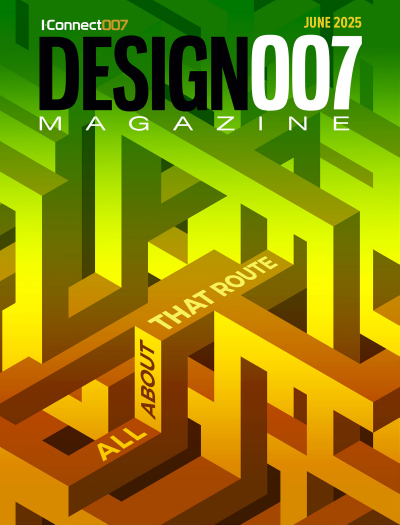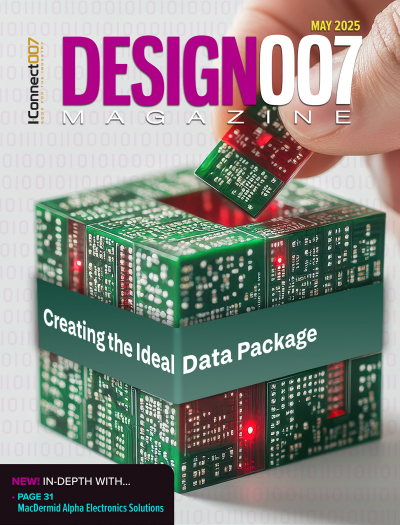-

- News
- Books
Featured Books
- design007 Magazine
Latest Issues
Current Issue
Showing Some Constraint
A strong design constraint strategy carefully balances a wide range of electrical and manufacturing trade-offs. This month, we explore the key requirements, common challenges, and best practices behind building an effective constraint strategy.

All About That Route
Most designers favor manual routing, but today's interactive autorouters may be changing designers' minds by allowing users more direct control. In this issue, our expert contributors discuss a variety of manual and autorouting strategies.

Creating the Ideal Data Package
Why is it so difficult to create the ideal data package? Many of these simple errors can be alleviated by paying attention to detail—and knowing what issues to look out for. So, this month, our experts weigh in on the best practices for creating the ideal design data package for your design.
- Articles
- Columns
- Links
- Media kit
||| MENU - design007 Magazine
Setting Goals for Your PCB Design Education
March 30, 2022 | Andy Shaughnessy, Design007 MagazineEstimated reading time: 2 minutes
For our March issue of Design007 Magazine on planning your design education, we spoke with Bill Brooks of Nordson ASYMTEK, a long-time PCB designer, CID instructor, and fantastic sculptor. He is also one of the first to ever teach standalone PCB design courses in a college.
After he earned his certification to teach the IPC CID workshops, Bill served as an adjunct instructor at Palomar College near San Diego, teaching beginning and advanced PCB design classes for 10 years. I asked Bill to share his thoughts on setting up a PCB design education career plan, and the need to stay on top of your game as a PCB designer.
Andy Shaughnessy: You’ve had experience teaching PCB design at the college level, as well as decades of industry experience. When you were teaching, how did you help your students plan their educational objectives?
Bill Brooks: When I was teaching at Palomar College, each student wanted something different out of the education and curriculum. Some students were looking to enhance their existing experience by adding PCB design to their electronics knowledge base. Some were trying to gain the necessary skills to get a specific job designing PCBs in the electronics industry, and some were taking my classes to fill out a degree program at the college without ever using the knowledge in our industry.
We helped them define their personal objectives by asking questions about their personal goals. Then we offered the entire class the goal of achieving certification though the IPC Designers Council. Before you start a journey, it’s a good idea to know where you want to go, develop a plan to get there, execute that plan, evaluate your progress, and make any adjustments make along the way.
Shaughnessy: What would you advise to PCB designers who want to set up their own strategic learning plans and educational objectives?
Brooks: Understand where the industry is headed and prepare for the skills you will need to place yourself as an asset in the industry. Ask questions of the experts in the field, connect with others who are going the same direction. Never stop learning; be curious.
Shaughnessy: What criteria should designers keep in mind when evaluating their educational needs to stay on top of their game in the industry?
Brooks: Printed circuit design methods and knowledge are not static. Learn about the resources available from authors, industry experts, manufacturers, and assembly houses. Help educate yourself and then stay connected.
Shaughnessy: When I first started covering PCB design in the late ‘90s, there were no “critical paths” to becoming a designer. Is an engineering degree becoming the critical path for future designers?
Brooks: No. Though many aspects of PCB design are engineering tasks, an engineering degree is not required for much of what we do. There are good tools out there to help and having an interest in solving puzzles is more useful than knowing transistor theory.
Shaughnessy: Is there anything else you’d like to add?
Brooks: Get to work.
Shaughnessy: Good advice. Thanks, Bill.
Brooks: Thank you, Andy.
This conversation originally appeared in the March 2022 issue of Design007 Magazine.
Testimonial
"We’re proud to call I-Connect007 a trusted partner. Their innovative approach and industry insight made our podcast collaboration a success by connecting us with the right audience and delivering real results."
Julia McCaffrey - NCAB GroupSuggested Items
Nolan’s Notes: The Interconnectedness of a Global Supply Chain
08/04/2025 | Nolan Johnson -- Column: Nolan's NotesYou may recall when I’ve discussed the research and development of a particular magazine issue topic and how, at times, I’ve pivoted at the last minute because of what I learned from the information I’ve gathered. This month, my original focus was on cultivating your brand, but the more I investigated the topic, the more my subject experts leaned toward international supply chain strategies. Not surprisingly, these two disparate topics are far more interrelated than they might seem.
I-Connect007 Editor’s Choice: Five Must-Reads for the Week
08/01/2025 | Nolan Johnson, I-Connect007We start with the latest report from the Global Electronics Association: North American PCB sales are down 8.6% in June. That might sound grim, but keep reading—there’s more to the story. Bookings are holding steady, and Dr. Shawn DuBravac offers context that paints a more balanced picture. Next, we turn our gaze to India, where mobile phone exports have surged 127-fold over the past decade. That stat alone says volumes about India’s emergence as a force in electronics manufacturing, something we’ll be digging into more deeply in an upcoming SMT007 feature.
Brent Laufenberg Appointed CIO of the Global Electronics Association, Advancing Technology and Member Services
07/31/2025 | Global Electronics AssociationThe Global Electronics Association (formerly IPC International Inc.) announces the appointment of Brent Laufenberg as its new Chief Information Officer (CIO).
Teramount Raises $50M to Address Growing Demand for AI Infrastructure Optical Connectivity
07/31/2025 | PRNewswireTeramount, the leader in scalable fiber-to-chip interconnect solutions for AI, data centers and advanced computing, today announced it has raised $50 million in financing led by new investor Koch Disruptive Technologies (KDT). Existing investors Grove Ventures and several new strategic investors, including AMD Ventures, Hitachi Ventures, Samsung Catalyst Fund and Wistron, joined the round.
Considering the Future of Impending Copper Tariffs
07/30/2025 | I-Connect007 Editorial TeamThe Global Electronics Association is alerting industry members that a potential 50% tariff on copper could hit U.S. electronics manufacturers where it hurts.


